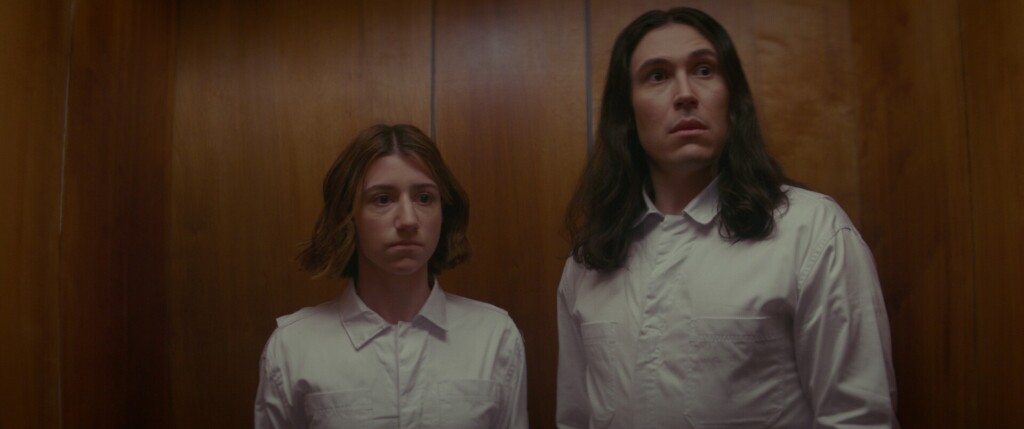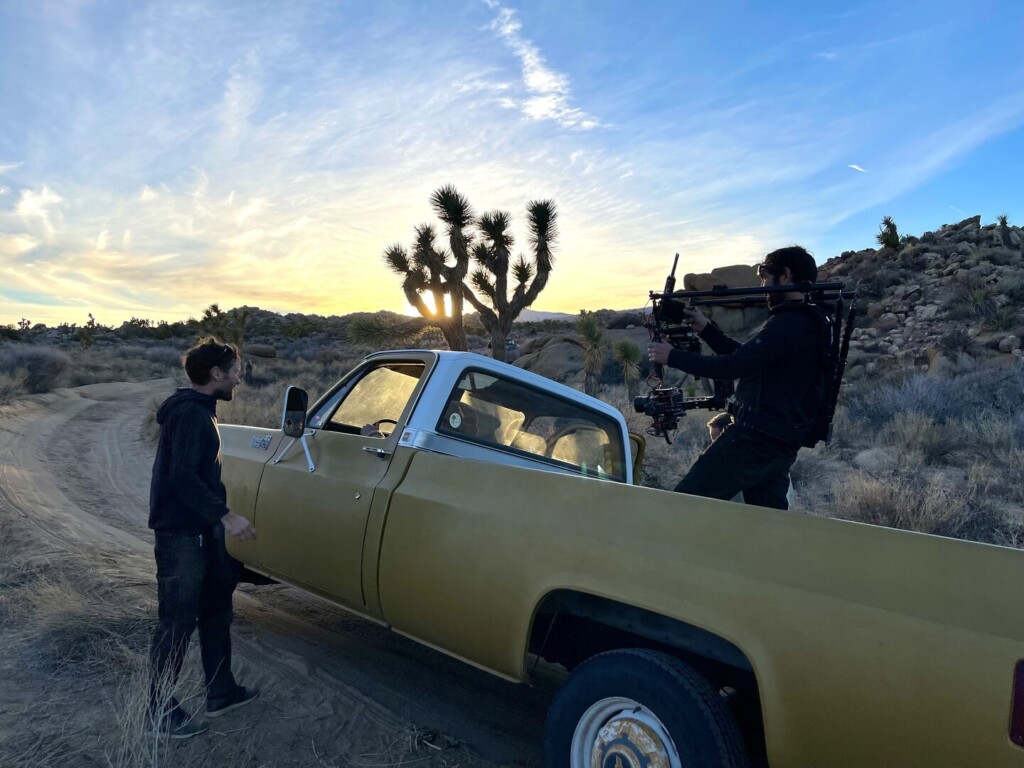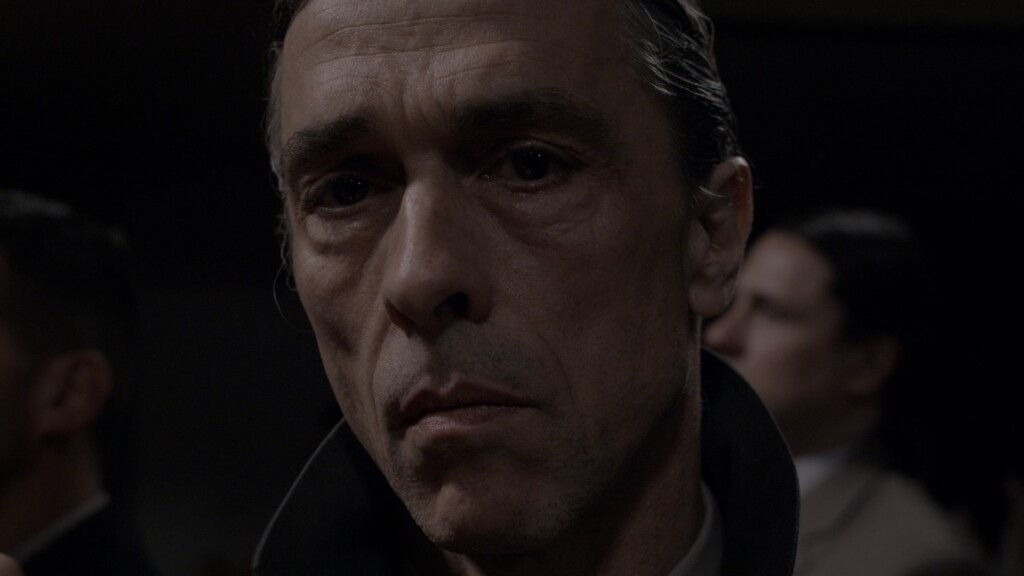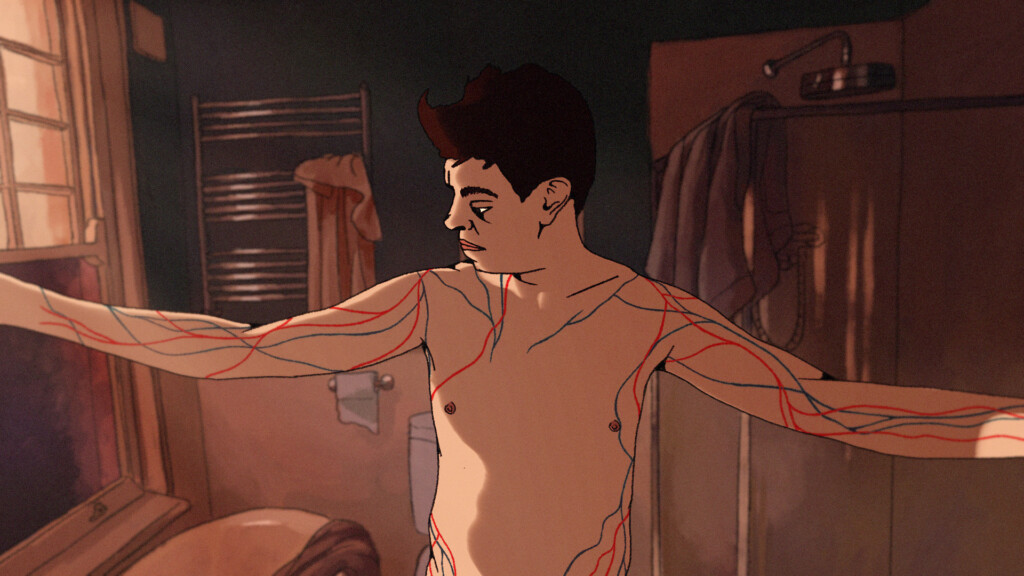Next to the Sundance Film Festival’s tremendous short film program, the 21st edition of the internationally acclaimed Fear No Film program at the Utah Arts Festival is the second most distinguished short film slate in Utah.
Coordinated by Derek Mellus, who also is the film production manager for the Utah Film Commission, Fear No Film returns with 73 films in 14 programs. The screenings are accessible to the public, even those who do not have a festival ticket, and will take place in the City Library Auditorium. The films were culled from 345 submissions from 54 countries.
Among the elite short films on this year’s slate is Ninety Five Senses, an animated film from Jared and Jerusha Hess, who are well known for their viral comedy hit Napoleon Dynamite. This exceptional animated short was nominated for the Academy Award this year for best short film. The film was made with the Salt Lake Film Society’s MAST program. MAST provides grants, training and mentorship to animators and filmmakers, with a special emphasis on projects that change minds and change the world. Its program includes a fellowship, labs, mentorship, career advocacy, networking, contests, productions and funding. Others include The Masterpiece, which won this year’s Sundance Film Festival’s grand jury prize for best short film; Before the Pandemic and War, There Were Bedbugs and Love!, which won best documentary short film at the Boston Shorts Festival, The Steak, the 2024 Slamdance Film Festival AGBO Fellowship Award Winner, and Fár, a 2023 Cannes Nominee for the Palme d’Or for Best Short Film.
Given the large proportion of films (48%) from student or first-time filmmakers, this year’s screening slate includes an Emerging Artists series of three narrative blocks and one documentary program. A jury will determine various awards including grand jury prizes, honorable mentions, Utah Short Filmmaker of the Year and Fear No Filmmaker Award. Some 43% of the films come from female directors in the festival. In addition to Hong Kong, the slate this year includes short films from Ukraine, Pakistan, Hong Kong, Iceland, Lithuania, and Serbia.
The Utah Review screened 23 short films, which qualify as must-see for the festival:
Science fiction is popular in the slate of films this year, most notably with the topic of artificial intelligence and characters resembling the Replicants from the neo-noir futuristic classic Blade Runner, from 1982. In Recall, an unsuccessful actor who needs money is accepted as a surrogate mother in a lucrative beta program where she will foster the care of a seven-year-old replicant girl. The compact narrative is gripping and sharp. The film was directed by Jennifer Massaux, a Belgian national who now lives and works in Los Angeles. Massaux, who also directed two other award-winning short films Into You and Time Bomb, co-wrote Recall with Ryan Vallan.
Another riveting short about AI, Soulmate, directed by the U.K. award-winning director and writer Richard Fenwick, moves nicely along in narrative tension. The protagonist (Anna) works as an computer coder at an advanced tech firm and has risked her future with the company, by engaging in an unauthorized romance with an AI figure in a computer simulation. When she learns that the company is investigating a security breach, she races to protect herself while trying to save the relationship she has grown so fond of that she does not want to end it.
From Utah, Derek Romrell directed and wrote To Err, a sci-fi short set two centuries after humans went extinct and now an android, who has been learning the preserved memories of the former human civilization is affected by an irresistible sense of nostalgia and longing. In part, Romrell was inspired by Gnosticism which contends that Adam’s first created wide was Lilith, who came not from a rib, but from the earth as Adam had done. The tension of the protagonist in the film is the rebellious evolution of the android or replicant who desires to become fully human and sentient in the emotions associated with being human. This becomes an intellectually stimulating and engrossing narrative in Romrell’s hands.
A comedy short that is a curious blend of Office Space and Close Encounters of the Third Kind, You Are Here is about an insurance salesman who is gobsmacked to learn not only that are 250 billion stars in the Milky Way Galaxy but that the number of galaxies in the universe is even more staggering. Its director, Michael Friberg, an award-winning commercial and editorial photographer turned filmmaker, recalled when he was browsing news on The New York Times app in 2019 and was struck by an article: “I saw a headline that launched my banal morning constitutional into an existential free fall. It read: ‘Milky Way Galaxy Now Thought to Contain 250 Billion stars.’ Intellectually, as an adult man with a questionable liberal arts college education, I understand that space is big. Infinite even. But for some reason, upon seeing that number, I really, truly felt it. I felt the floor falling out from under my precious dungeon as my entire existence suddenly seemed meaningless. I felt physically ill. The sudden knowledge of my insignificance came on as if I had eaten the apple in the garden of Eden. I knew too much now and I was cursed forever with this burden. How was I supposed to just go about my day, paying taxes and making small talk when I knew that in the blink of an eye everyone I knew and loved would be gone, just another speck of dust lost to the winds of an ever expanding, infinite abyss.” Indeed. The character Peter Kleebold in the film encapsulates precisely those sentiments.
A fine piece of first-person documentary art, O que queda, (What Remains) is a familiar, eloquent contemplation about our immersive connection to social and digital media on our mobile devices and the struggles of deciding what to keep and what to delete from the voluminous content we generate for our online accounts. The 2022 film, in Galician with English subtitles, was directed by Alejandro Rodríguez and it raises questions about how we keep memories of the experiences we have in relationships and the events that mark our lives. The film is part of a catalogue of New Spanish Shorts, which is promoted by the ICAA (Ministry of Culture and Sport of the Government of Spain).
From Hong Kong, a poignant and bittersweet animation short, Everywhere, directed by Tommy Ng and Step C. addresses how we can possibly process our grief when we lose someone we love so dearly and hope to find solace through memories that will never be lost. The story is told through the perspective of two adorable cats who are inseparable friends. This short is a wonderful companion to O que queda.
The Masterpiece, which won this year’s Sundance Film Festival’s grand jury prize for best short film, is a master class in impactful narrative structure and epiphany compacted in a 20-minute timeframe. Directed by Àlex Lora, who has won more than 100 award at international festivals, along with seven Emmys and two Gaudí Awards, the film is less about the painting that becomes the key element of dramatic tension than it is about systemic racism, economic privilege and the problems of reductive binary thinking. The film opens when a well-do-to do couple drop off a broken television screen at a recycling station. They decide to take up the offer of a father and son, who are scrap and salvage dealers, to come to their home and see if they would like to pick up other discarded objects. At first, the husband worries that allowing these scrap dealers into their home might not have been such a good idea but the dynamics are transformed when the father and son realize that one of the objects set aside for scrap is actually a painting of great value.
As noted earlier, Ninety-Five Senses, made by Jared and Jerusha Hess in conjunction with The Salt Lake Film Society’s MAST program, was one of the Academy Award nominees. It achieves the rare impact of such emotional power that it will profoundly move the viewer, even to tears. Tim Blake Nelson provides to voice of Coy, a death row inmate who reflects on events in his life through the human senses. In an interview with Animation Scoop, the Hesses explained how the story of Coy extends ultimately to all of us. “We hope that when people watch the short, it renews their appreciation for their own senses. We were actually in production during the bleakest stretch of Covid, when everyone was losing their sense of smell,” they explained. “It made us realize how much less enjoyable life is without that ability – food tastes worse, you lose your appetite, it just drains the joy from so many things that make life worth living. So, that experience definitely informed our choices. One of our favorite reactions to the film was from a woman, the grandmother of a friend, who’s in the beginning stages of macular degeneration. She’s losing her eyesight. Our friend told us she got very emotional hearing Coy’s description of savoring his senses. She said it made her grateful for the sight she still has.”
From Spy Hop’s nationally acclaimed PitchNic student film program in Salt Lake City, My Name is _____, directed and written by Aria Gunter with Riley Nickel as producer, is representative of the smart student films that consistently come from the programs. The film’s acting and screenwriting reflect sensitively on the experiences of a trans teen, her identity and the steps to be accepted and affirmed for who they are. “Creating this film was an extremely introspective process as a trans woman who transitioned throughout high school, Gunter explained in her director’s statement. “A lot of people don’t know what it’s like to be trans so I wanted to get an accurate representation of what a trans person can experience in their daily life. To provide representation that isn’t demonizing or harmful and dispel the hateful rhetoric surrounding trans issues.”
From Utah, a TWIG Media Lab production, In The Skies, directed by Chris Lee, is about a young brother and sister who hope to catch signs of aliens out in the remote desert but the stakes quickly become more onerous. Great Utah collaboration here, with Alex Lee joining as cinematographer and Taylor Mott as writer. The four actors include Andie Mueller, Nate Morley, Charla Bocchicchio and, a pleasant surprise, Cody Chamberlain, a prominent Utah painter.
Applause, from Portugal, is of the most unusual films on the Fear No Film slate but its unconventional and unnerving story-telling about the cult of personality is impactful and unforgettable. Directed by Guillermo Daniel, the 13-minute film almost entirely comprises applause and a handful of spoken lines. But, viewers should take note of shots of faces and body language. Daniel was inspired to make the short based on one testimony that the great dissident writer Alexander Solzhenitsyn collected in his research about Stalin in the Soviet Era. As the director recalled, “At a meeting of a district committee from the Communist Party a message of loyalty to comrade Stalin sparks an endless ovation, because in the middle of the room members of the NKVD, the secret police of the state are also applauding. As minutes after minutes pass, the situation becomes ridiculous, but the first person to stop applauding the great leader seals his fate – 10 years in the Gulag.” But, more importantly, the film reminds the viewer, as Daniel explained, “ that these demonstrations of unmeasured cruelty occur in all autocratic regimes, but memory is short and oblivion settles in the comfortable world. Narratives like these take on fabulistic contours, but it is necessary to keep history alive.”
From France, Papa Bouteille is a beautifully rendered animated narrative about an eight-year-old child and the unconditional love for a father, who is caring but also has an addiction to alcohol. The imagery is vivid and compelling but also surprisingly gentle and touching. The 2024 film was the result of a graduation project for French student filmmakers and it won the jury first prize when they presented it. The film was directed by Lucie Carraz, Eleonore Deprun, Lalita Bruguiere, Clement Breto, Pierre Étienne Mazet and Fred Marcassoli.
It has been a few years since Fear No Film has received films from Belgium but filmmakers from there have been known for quirky and oddly humorous shorts that have taken the grand prize at this festival. Wander to Wonder, directed by Nina Gantz, is one of those gems. Note the incredibly well-executed stop-motion animation. Known for stories that have dark and twisted humor, Gantz has won five major international festival awards, including a juried award for best animated short at this year’s SXSW.
The story is about a television show for kids that was popular in the eighties but with the creator having passed away, the trio of miniature human actors are utterly lost, abandoned in the studio. Amidst the decay and the fact that they are being starved, they nevertheless continue to make episodes of the show which are weird in the most extreme sense of the word.
Another quirky delight from Belgium, Beautiful Men, directed by Nicolas Keppens, is about three brothers who are fretting about going bald and decide to travel to Istanbul for a hair transplant. The problem is that the brother who scheduled the appointment did not realize that it wa only for one of them. While they try to sort out who should have the hair transplant, their insecurities come pouring out without restraint. This 2023 short has fantastic and realistic stop-motion animation, just like Wander to Wonder.
From the U.K., Scale, directed by Joseph Pierce, is another outstanding piece of animation. Pierce was inspired by the memoir of writer Will Self and his crippling drug addiction, which he told in the third person. Note Pierce’s use of rotoscoping in the making of this film. LI’ve always thought of my form of rotoscoping as acting like an ‘internal dialogue’, where the animation often betrays what the character says and exposes their inner workings. As Scale deals with a character who’s struggling with addiction and trying to remember his past, I thought this would be the ideal marriage of story and technique,” Pierce said, in an interview with Directors Notes. “I’ve skirted around issues of mental health and addiction before, but here I tackle it front on. I wanted to create an honest and frank portrayal of addiction but rather than the typical ‘kitchen sink’ realism I wanted something hallucinatory and surreal. The concept of losing one’s sense of scale seems only achievable through animation. The book is a very literary one, Self plays with the word scale in all its forms; scale as a measurement, scales of a lizard, bathroom scales, limescale. So one of the fun challenges was how we visually play with the idea of scale and perspective. We drew inspiration from a wide range of sources including Alice in Wonderland, Godzilla, Gulliver’s Travels, Willy Wonka and the real model village Bekonscot.”
From France, Auxiliare, directed by Lucas Bacle, which he wrote with Laurent Target, is about a man who has been caring for a friend who uses a wheelchair and has extremely limited mobility who is trying to decide if he should pursue a career as a chef. An award-winning short, it is superbly acted and written, offering a genuinely credible manifestation of how we reconcile and resolve our self-doubts.
A wonderfully informative documentary, 40°N, 73°W, directed by Sandy Williams IV, springs from a Juneteenth 2023 event in which a skywriter was recruited to trace the borders of one of the first recognized free Black communities in the country — Weeksville in the heart of Brooklyn’s Crown Heights district. Williams develops the film into recognizing Weeksville’s history not only for its archival significance but for the purpose of ensuring that the past’s relevance never loses it instrumental purpose in rectifying the wrongs of history. The documentary is part of the director’s larger project the 40 ACRES Archive, which Williams explained, “By relating to the Reconstruction Era—both regionally and nationally—and supporting events meant to tell these stories, we continue to build more honest insights into how many communities around the country collectively reconstructed themselves around specific models of White supremacy after the Civil War and repeatedly forestalled the advancement of communities of color, resulting in the many socioeconomic inequalities we currently live within.”
A finely contextualized documentary about whether a Utah story is historically accurate or is merely an apocryphal legend, Whales of the High Desert, directed by Joseph Adam LeBaron, recounts the story of James Wickham, an Englishman who was reported to have brought whales to Great Salt Lake in the 1870s. But even it is deemed as folklore, the film brings to bear the stakes of contemporary threats to keeping and improving the viability of the Great Salt Lake. In his director’s statement, LeBaron explained, “I knew the story needed to pivot—and what once was a story only about Whales living in the high desert of Utah, turned into a story about Whales living in the high desert of Utah—and a call for conservation.” He added, “Using Wickham’s story as the backbone of our film we want people to remember the Lake for all that it once was and can be again. It doesn’t have to be a ‘threat’—it can be a destination—it can serve once again as something alive enough to inspire grand stories and legends out of time.”
Nada de Todo Esto (None of That), an Argentinian film directed by Patricio Martínez and Francisco Cantón, is an astute slice-of-life social commentary. Driving through an affluent suburb, a mother points out to her daughter the features of many expensive homes but is so distracted that she drives her car into the well-kept garden in front of a grand home. While the daughter searches for some rods of wood to assist in getting the car out of the mud, the mother acts somewhat bizarrely, as she explores the home and becomes enrapt with its rich trappings. From there, all sorts of unpredictable behavior and responses ensue, specifically over an expensive sugar bowl that the owner of the home esteems over everything else.
An entry from Iceland, FÁR (Intrusion). directed by Gunnur Martinsdóttir Schlüter, moves swiftly from a routine business meeting in a typical cafe into the profound territory of a moral dilemma. To the point, the five-minute film asks viewers to recognize the problems of being insensitive and unaware to people and events that surround them, even on ordinary days such as the one portrayed in the film. Early in the film, a seagull flies into the window and collapses on the ground, which sets up the primary tension. “I wanted it to be unexpected and somehow cut into the atmosphere inside the coffee house. I can’t describe the atmosphere in the coffee house, since I think the audience can read out of it what they want,” Schlüter said in an interview with Directors Notes. “The protagonist of the film is observing and we see the coffee house through her eyes and mind, but it’s up to the audience to decide or feel what she is experiencing.”
Gianfranco Fernández-Ruiz’s Saborrrr! is a fine sharp comedy with well-place tinges of horror elements, whicb earned him best director honors at the 2024 Zepstone International Film Festival Awards. The film succeeds as a satire, which Fernández-Ruiz intended. He explained in his director’s statement that “our characters won’t be immune to finding themselves in harrowing, sometimes downright terrifying situations, but a more exploitive lens will be shattered by representation that champions the individual to reclaim their power.”
From Lithuania, Before Pandemic and War, There Were Bed Bugs and Love! is a great little documentary. Nuruzzaman Khan, a native of Bangladesh, directed the film, which reflects on a relationship with a woman that had high expectations of becoming meaningful, as the couple would make films, open their own restaurant and adopt orphans. The title suggests everything that becomes of major importance in their story including those pesky annoying nocturnal parasites.
5/3/0, a narrative short from Serbia which is directed by Danilo Stanimirović, is about Saška, a young teen woman pf 14, who hires a taxi to take her to a birthday party. The cab driver asks all sorts of questions and while she tells him that she plans to take a bus home after the party, he insists on giving her a business card to call him if she needs a cab later in the evening. Saška ends up staying at the party longer than anticipated and reluctantly decides to take up the drive4’s offer. When he picks her up, he nags her to join him in the front seat. The closing scenes of the film suggest what happens next. Stanimirović handles this with fine sensitivity. In his director’s statement, he mentioned connecting with a friend from their school days, who told him about a taxi driver who attempted to sexually assault her. “I was horrified when I realized that the taxi driver who tried to rape her is still working in the neighbourhood of our hometown,” he explained. “I could not stop thinking about the details of her story, and the fact that I, as well as none of the other friends in the class, never heard about what happened. That is why I felt the need to tell this story and dedicate it to her, as well as to attempt to deal with the problem of distrust on the part of society towards victims.”














thank you.